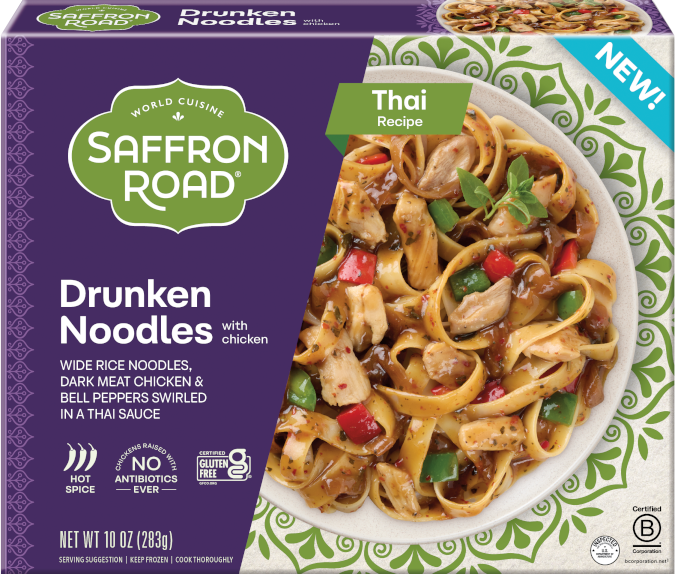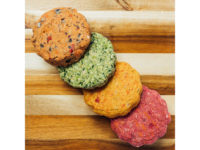FROM THE COLD CORNER
Saffron Road CEO Adnan Durrani on Building a Better-For-You Brand
R&FF sat down with Adnan at Frozen IQ, where he spoke about sharing the benefits of frozen foods with consumers.

The better-for-you food movement is on fire and Saffron Road is among the F&B brands leading the charge. Inspired by world cuisines, and made with high-quality, ethically-sourced ingredients, all Saffron Road products are Halal-certified. Led by founder and CEO Adnan Durrani, the Certified B Corp’s products are sold in over 25,000 U.S. retail locations. Last month R&FF sat down with Durrani at Frozen IQ, in Fort Worth, Texas, where he spoke on a panel about sharing the benefits of frozen foods with consumers.
Durrani in 1991 founded Vermont Pure Springs (Crystal Rock Water), which grew to become the second largest bottled water brand in the Northeast. He also was a partner and principal shareholder in Stonyfield Farms, Inc., which sold to Groupe Danone in 2001.
He was inspired to create Saffron Road for healthier frozen meal options that could bring cultures together. The company’s slogan is Journey to Better.

Saffron Road CEO Adnan Durrani Sits Down with R&FF at Frozen IQ
Inspired by world cuisines, and made with high quality, ethically sourced ingredients, all Saffron Road products are Halal-certified.
Listen to more From the Cold Corner podcasts.
“Gary Hirschberg, you know, when I partnered with him in Stonyfield, he taught me really like a mentor to me about how important it is to emotionally connect with consumers, which is what Stonyfield did with its activism around sustainable agriculture and food. So that's what I really wanted to do – create a brand that was really all about animal welfare because I didn't see any brands that could had animal welfare in the entree section. We were the first stores entree in the world that was Certified Humane from all of its farms. And we were the first entree in the world that got non-GMO verified by the (non-GMO) Project.”
The company uses data from a variety of sources, including Numerator, which uses an app to collect shopper receipts, surveys and more, to target the “better-for-you” consumer.

“A Saffron Road shopper is spending 2-X in the category versus a regular shopper – spending 136% more in dollars than the average frozen entree shopper,” Durrani said. “So, a Saffron Road shopper at a Whole Foods will spend two times what an average Whole Foods shopper spends on basket. So, they might spend $10 on Saffron Road but they're going to leave the store spending $150 to $200. That's a really important step for a retailer because I'll tell them, look, we may not do the velocity of some of your other brands that are selling for half our price. Or, even some of your private label velocities. But, guess what? There's a battle for this consumer, the shopper to come into your store, we're bringing them into your store. It's not just about the money you'd make on Saffron Road; it's about the other 90% of that basket that's really critical to you as a store.”
With about 20 staff members, Saffron Road uses contract manufacturers and relies on an in-house culinary development team who monitors menus, from fast casual to white tablecloth.
“It's all about our team really. I have very little to do with it. Like I said, my ideas rarely make it to the shelf. It's a relatively small team that works very passionately and I'm inspired by them every day,” he said.
Although they have refrigerated and shelf-stable products under their brand, the company is focusing on frozen, something Durrani calls their “wheelhouse.”
“We are obviously very strong in Indian and Thai, but people don't realize we even launched Korean. We're getting deeper and deeper into more Asian cuisines and especially Mexican. We haven't even touched the Latin category. And, I think that's a huge category and when I look at the Hispanic demographic and the disconnect between that demographic and the purchase occasions that they have an affinity for, it’s a white space that's really open game right now,” Durrani said. “Be unapologetically authentic, really try to push the envelope around that, but at the same time, think about what would resonate with the mainstream consumer. So you want to really be on the edge of as ethnic as you can be, but at the same time, don't go so far over the edge – you want to be inclusive, not exclusive of any consumer.”
For more listen to the complete podcast in the podcast player above or wherever you download your podcasts.
Looking for a reprint of this article?
From high-res PDFs to custom plaques, order your copy today!






